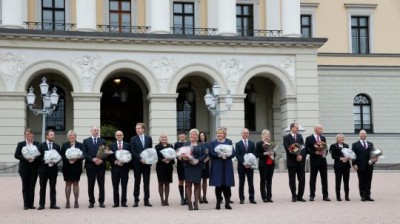NEWS ANALYSIS: Norway’s new government ministers were probably glad when the weekend rolled around, even though that doesn’t mean they necessarily get any time off. Several of them had already been subjected to scathing criticism from political opponents and in the media, after already submitting themselves to a tough screening process by Prime Minister Erna Solberg. Meanwhile, critics also railed against what they called the “quota system” that led to their appointments.

“We have talked with them about whether they have any skeletons in the closet,” Solberg told newspaper Aftenposten on Sunday. “There are some who have them. Then we had to evaluate whether they could be government ministers (statsråder) anyway, and the answer was yes.”
That suggests that she’ll be defending them when the going gets rough, and it already has for some of the ministers. The new minister in charge of family and equality issues, Solveig Horne of the Progress Party, was the target, for example, of widespread criticism over remarks she made three years ago, when she questioned whether young children should be read to about homosexuality, and that both girls and boys can be responsible for teenage sexual assault. She later said she never meant to imply that rape victims should share guilt, and that only the rapist is responsible.
New Justice Minister Anders Anundsen, meanwhile, also caught headlines for publicly burning what he said were “the last issues of (local newspaper) Tønsbergs Blad” that he would read. Anundsen also urged his 2,647 Facebook friends to cancel their subscriptions to the paper and drop any friends they may have who are journalists there. That was just after the election, and several weeks before he was tapped to be justice minister, a job that means he’ll need to back measures against Internet bullying. He was accused of doing exactly that, and that it was wrong for a justice minister to boycott a newspaper because he didn’t like its opinions. He later relented and said he never meant to propose a boycott.
Experience and solidity aside…
While Horne was less of a household name in Norway, Anundsen has been among the most highly respected ministers coming from the Progress Party. Even commentators on the left side of Norwegian politics have praised his experience in parliament and that of nearly all of Solberg’s cabinet, as solid, study and predictable politicians.
The left-center opposition in parliament, however, will jump at any opportunity to bash the new conservative government, and Eskil Pedersen of Labour’s youth organization AUF, who is gay himself, was quick to claim he’d be revitalizing the gay rights movement after Horne’s comments. Newspaper Dagens Næringsliv (DN), meanwhile, shrugged off much of the fuss, calling it “homo-hysteria” and noting that it’s not unusual for politicians in opposition to phrase things differently from when they’re in government position.
Farmers’ foe?
Sylvi Listhaug, meanwhile, the new minister for agriculture, was also fending off criticism over not just her own earlier criticism of the enormous state subsidies that farmers enjoy but also over her past few years of work for one of Norway’s most influential and secretive public relations firms, First House. Not only were many demanding to see who her clients had been, she was pilloried for having once equated Norwegian farming to communism. Listhaug, though, who grew up on farm and claims she can still milk cows, was planning to meet with farming leaders on Monday, to explain her views and her hopes that they will be able to work together to make farmers less dependent on the state.
Even Nina Jensen, the head of Norway’s chapter of environmental organization WWF who also happens to be the sister of new Finance Minister Siv Jensen, was bashing Listhaug for having refused to acknowledge in the past that climate change results from human activity. Listhaug, along with other government ministers subject to attack, said that she can’t spend time defending every comment she’s made in the past. Now she’ll follow the new government’s stated views on the issues, in line with Solberg’s insistence on that.
Quota system under attack
Overhanging all the criticism against individual ministers was more general disappointment over the so-called “quota system” believed to guide ministerial appointments. Prime ministers in egalitarian and far-flung Norway pay careful attention to making sure equal amounts of men and women are selected, and that they represent all geographic areas of the country. Solberg stressed that her cabinet reflects “the entire nation,” but others weren’t so sure. There are actually very few from the Oslo area, given its population dominance, only one from Northern Norway and none from the large counties of Hedmark, Oppland and Buskerud. Western Norway, where Solberg herself hails from, is, however, very well-represented.
Industrialist Jens Ulltveit-Moe was quick to complain on the day after Solberg’s cabinet was official announced that the “quotas had gone too far,” resulting in the Conservatives’ environmental wonderboy Nikolai Astrup from Oslo being aced out of the post as minister for environmental protection by Trine Sundtoft from Lillesand in southern Norway. “Nikolai Astrup is an unusually gifted politician,” Ulltveit-Moe told newspaper Dagsavisen. “He has shown great professional insight in environmental policy. I’m amazed (that he wasn’t named minister for environmental issues). It’s important to represent the whole country, but not to exclude Oslo.”
Solberg won kudos for naming nine men and nine women (including herself) as ministers. She could hardly have more gender equality, yet she caught flak that fully 30 of her government’s 39 state secretaries are men, as well as 10 of 14 political advisers.
Astrup himself was gracious about being overlooked for a spot in the government. “I’m certain that Erna has made a solid evaluation and that (Sundtoft) will do a good job. I wish her good luck.”
newsinenglish.no/Nina Berglund

